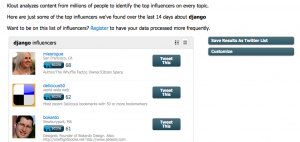As the web enters a more user-centric era where conversations can be gold mines, you will soon need the ability to filter content and news based on the influence level of the messenger to cut through the noise. If you are looking for good blogs or discussions about Django (my current framework of development), you should be able to see any post/tweets written or commented by Jacob Kaplan-Moss (one of the lead developer) at the top of your search results.
To do that, you first need to determine who has some influence online around that topic. There is currently multiple web services to evaluate user ranking, and I’ve reviewed some here. Klout is another of those services and a pretty popular one. Main problem with most of them is that they usually have no concept of relevancy : they evaluate your reach, influence, activity and other parameters as a generic score, without any relation to a topic or domain of influence.
I’ve just performed a search for ‘Django’ in Klout’s topics search box. Number one influencer on this somewhat niche topic is … Tara Hunt aka MissRogue. For those who might not know here, MissRogue is a successful author/marketing consultant/entrepreneur with a somewhat decent audience of … 29757 (Dec 1st 2009)followers on Twitter. She probably knows more about Django than the average person, but I would have expected Jacob Kaplan-Moss or some of the bloggers in my Django links collections to be slightly above her in such ranking…
What happened is probably that she tweeted that keyword several days ago and the Klout engine pick it up, putting here in their Django topic basket and by looking at the outstanding number of followers she has, promoted her to the top of the list. A more complete analyze of her tweets would have been enough to avoid this error. Further analysis of shared link would be even better, but slightly more complex.
User Ranking methods and technology will most certainly become ubiquitous in a near future and evolve into something solid and relevant enough to be used as a content and conversation filter, as well as for targeted advertising purposes. A great example of the relevancy concept can be found in Traackr from which I just got a demo. They still do some manual intervention for quality assurance, but they have included a relevancy score related to the queried domain, as I would expect. We talked a little bit about their roadmap and they seems to have some pretty interesting stuff coming up.
Are you planning to use some kind of User Ranking in your applications or web strategies ? How ? What are you expecting from such tools ?

![Reblog this post [with Zemanta]](http://img.zemanta.com/reblog_e.png?x-id=17ab1648-5c2a-45cf-825b-aa6bd2937aa7)